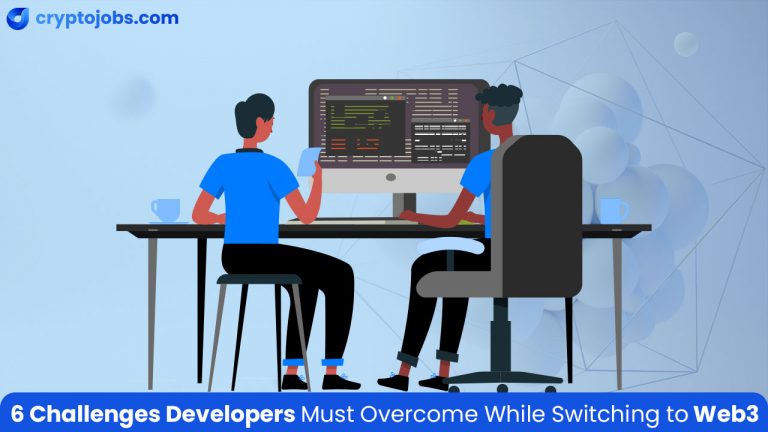
6 Challenges Developers Must Overcome While Switching to Web3
- cryptojobs.com
- January 1, 2024
- All Posts, Web3
- web3 development
- 0 Comments
The growth in Web3 has made it easier for individuals to find blockchain developer jobs. Web developers and architects working in Web2 are rapidly switching to Web3. Even with the influx of talent, there is room for growth.
Blockchain is still an emerging technology and that opens opportunities for Web2 developers to learn new skills and advance in an exciting new career. They do have the potential to become a part of a revolution. There are certain challenges they have to overcome to fit in, and if they can succeed at it, they can work wonders for the industry as a whole.
Here are six challenges that developers must overcome while switching to Web3.
Adopt the Web3 Mindset
Developers have to go through a paradigm shift when they switch to Web3. They have to build user-owned projects that favor the community rather than the corporations that rule the internet with an iron fist. This is a whole structural shift and developers need to completely change how they think of the internet. It is a big shift, but necessary. Once you have adopted the Web3 mindset, it will become much easier for you to become a blockchain developer.
Understand Smart Contracts
Perhaps the biggest challenge for developers is understanding Smart Contracts. A blockchain development company creates these contracts for their clients and customers. Smart contracts are an essential component of any Web3 business and are one of the foundations of blockchain development.
Coded on well-known blockchain systems like Ethereum and Binance Smart Chain, smart contracts are self-executing contracts. These creative contracts eliminate the need for middlemen by automating and enforcing the conditions of the deal. The purpose of smart contracts is to create trust between two working bodies, streamline transactions, and eliminate the need for third parties.
Blockchain companies hire expert Smart Contract Developers and Auditors to code, design, and audit these contracts. For a developer to make this a career, they will first need to have a complete understanding of the best security practices, blockchain architecture, and more.
Learn Web3 Coding Languages
The nature of blockchain has led to the rise of Web3-specific languages for protocols and smart contracts. Web3 programming languages should be simple for front-end developers to learn. These object-oriented programming languages are meant to be compiled, not run on an interpreter. Even though learning new languages could be challenging at first, doing so will provide individuals who want to work in Web3 development with a lot more options. Some of the most important Web3 programming languages are:
- Solidity
- Rust
- Python
- Go (Golang)
- JavaScript
- Move
- Vyper
If you want to know more about these Web3 programming languages, this article will help you out: The 7 Most Important Web3 Programming Languages
Letting Go Of Personal Data
In Web2, big tech companies frequently possess personal data that is used to identify users, alter their experiences, and sell advertisements. Web3 gives the user control over personal data. Working in a non-personal data-using environment can be challenging for inexperienced developers at first, especially in the fields of decentralized finance (DeFi) and Web3 payment apps. Developers must become used to building systems with only wallet- and on-chain-based data.
Getting Used to Open-Source Environment
You’re probably working in an open-source environment when creating a Web3 project. Web3 developers ought to be well-versed in using communication tools for decentralized teams and collaborating on open-source projects. Since open-source projects are meant to be freely accessible to everybody, it’s critical to adhere to recommended practices when it comes to documentation and comments. Furthermore, it’s critical to remember that malicious actors might access open-source code, so any possible vulnerabilities should be closely watched.
Keep Interoperability in Mind
Regardless of the format, the user’s access to the project will remain the same whether you develop a Web2 app for desktop or mobile users. However, in the current Web3 stage, developers must choose the blockchain that best suits their needs before they can move further in the project.
Given the variety of public, smart contract-enabled blockchains available today, Web3 developers ought to be aware of these variations and consider the most effective ways to market their projects. Developing a Web3 attitude for a more open and connected internet can be facilitated by comprehending and preparing for interoperability, whether one is creating for Ethereum, EVM-compatible, or non-EVM blockchains.
In Conclusion
The work blockchain developers do is rewarding on its own. However, the compensation for their hard work is worth all their efforts. The average blockchain developer salary is $111K whereas a more experienced professional can earn as much as $166K in a year. Plus, the work environment is the perfect channel for success and growth!




